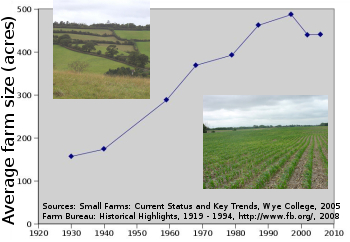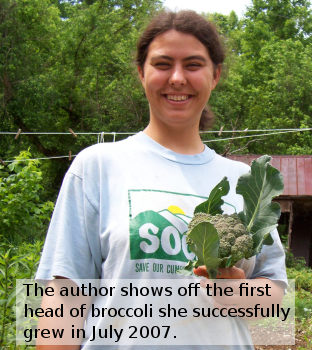
Holistic agriculture
The buzz of the honeybee
may soon be a thing of the past. Colony
collapse disorder (or CCD) is a fancy term to refer to the recent
decline in honeybee populations, a decline which has been
scientifically documented but which stems from causes that are less
well understood.
Although scientists aren't quite sure what's causing this sudden
decline in honeybee populations, they are united in the opinion that
loss of the honeybees will have profound implications on our
agricultural system. Approximately a third of our food crops ---
ranging from canteloupes to almonds --- depend on the honeybee for
proper fruit set. Without the bee, flowers will wither
unpollinated on the stalk and the farmer will have nothing to
harvest.
 I am concerned about CCD, but I am
more concerned that this disorder is a symptom of the failure of
America's industrial agriculture system. Our current system is
built upon the pipe dream that we can have unlimited supplies of cheap
food, that the finite capacity of the earth can be stretched with
pesticides and synthetic fertilizers to feed an ever growing number of
people on a dwindling expanse of arable land.
I am concerned about CCD, but I am
more concerned that this disorder is a symptom of the failure of
America's industrial agriculture system. Our current system is
built upon the pipe dream that we can have unlimited supplies of cheap
food, that the finite capacity of the earth can be stretched with
pesticides and synthetic fertilizers to feed an ever growing number of
people on a dwindling expanse of arable land.
I have no data to back up this hunch, but I wonder what percentage of
our maladies --- obesity, cancer, heart disease and other disorders
which have spun out of control in recent decades --- can also be linked
to cheap food. Does a broccoli head raised on farmed out soil
doused with 10-10-10 really contain the micronutrients we need to keep
our bodies strong, or does it merely make us crave more food because it
lacks the unlabelled nutrients we really need?
I am struck by an article my great aunt Ruth Tirrell wrote decades ago
in Organic Gardening and
Farming Magazine. In "Insect Control in the Small
Vegetable Garden", she mentioned many of the techniques organic
gardeners currently use to tempt or scare pests away from their
crops. But her overall message was more holistic. She
admonished us to remember this:
"Pests don't harm healthy plants much. Healthy plants, the kind that grow in humus-rich, properly fertilized soil, may be preyed upon occasionally, but they can take it."
 Can Aunt Ruth's holistic approach be used to
remedy the collapse of our agricultural system, and even of our own
bodies? Would honeybees thrive in an agricultural system which
minimized pesticides, replaced fertilizers with compost, and separated
vast tracts of farmland with frequent natural hedgerows? Would
our bodies heal themselves if we took the time to eat broccoli picked
fresh from our backyards and put on the table before the nutrients had
time to decay?
Can Aunt Ruth's holistic approach be used to
remedy the collapse of our agricultural system, and even of our own
bodies? Would honeybees thrive in an agricultural system which
minimized pesticides, replaced fertilizers with compost, and separated
vast tracts of farmland with frequent natural hedgerows? Would
our bodies heal themselves if we took the time to eat broccoli picked
fresh from our backyards and put on the table before the nutrients had
time to decay?
The time has come for us to accept the finite nature of our
earth. From growing our own food and learning to eat every part
of pasture-raised animals to packing lunches rather than relying on
fast food --- we must make changes in our lives before our ecosystem
and bodies collapse.
Note:
I wrote this for OnEarth's online
magazine, but wanted to share it while waiting to see if they'll
post it!
